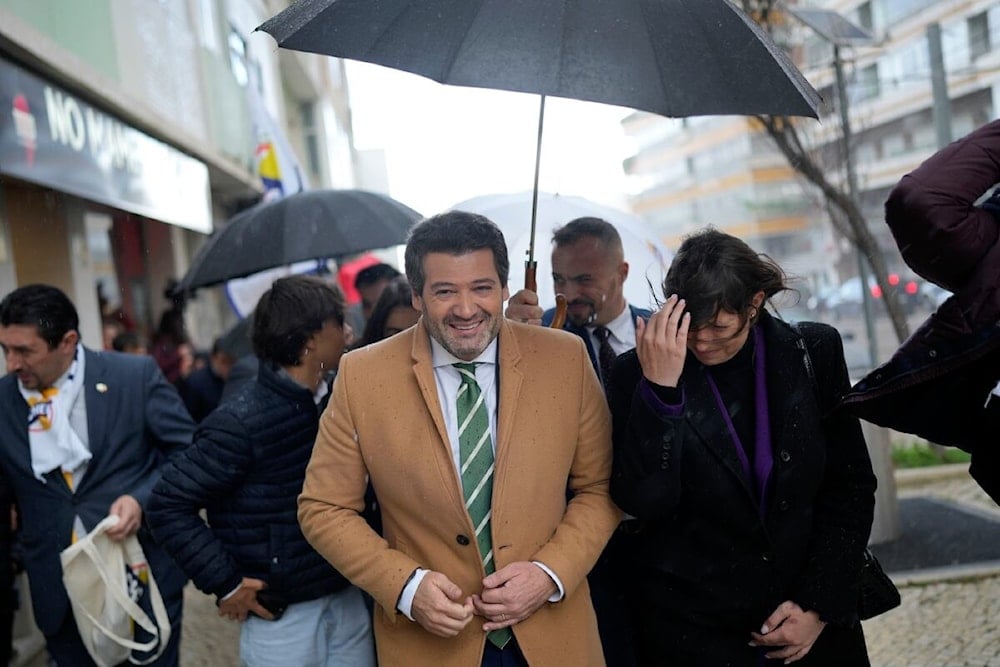Far-right Chega rises to 2nd in Portugal's 2025 legislative election
Far-right Chega becomes Portugal’s main opposition after 2025 snap election, overtaking the Socialist Party and overturning decades of two-party dominance.
-

Andre Ventura, leader of populist and nationalist party Chega (AP)
The far-right Chega party has emerged as the main opposition force in Portugal’s parliament following the 2024 snap election, marking a historic realignment in the country’s political landscape.
Founded in 2019 by former football pundit Andre Ventura, Chega overtook the long-dominant Socialist Party (PS) to claim second place, a first in modern Portuguese politics.
The centre-right Democratic Alliance (AD), led by Prime Minister Luís Montenegro, won the election but secured only 31.8% of the vote and 91 seats, well short of a majority in the 230-seat assembly.
The battle for second place between the PS and Chega remained undecided until overseas votes were counted on Wednesday.
Overseas votes give Chega 60 seats in Portuguese parliament
With 99% of domestic ballots counted on election night, both Chega and the PS were tied at 58 seats, though the socialists held a marginal edge in the vote share.
After the final overseas votes were added, Chega gained two additional seats for a total of 60, with 22.76% of the vote, narrowly trailing the PS’ 22.83%, which left them with 58 seats.
Ventura celebrated the result as a transformative moment for Portuguese politics. “This historic victory is also yours, it is Portugal’s!” he declared on X, calling it a mandate to change the country’s political direction.
In 2019, Chega secured just 1.3% of the vote; by 2022, it had reached 7.2%, and last year, it surged to 18.1%, with its seat count jumping from 12 to 50. Its ascent reflects growing public disillusionment with mainstream parties amid ongoing crises in housing, healthcare, education, and low wages.
Socialist Party leader resigns after electoral collapse
The PS’ defeat led to the resignation of its leader, Pedro Nuno Santos, just hours after the polls closed. Carlos Cesar, president of the PS, accepted the party’s relegation to third place, acknowledging the shift had been “on the wall since election night.”
He said the party would undergo internal reflection and restructuring ahead of electing a new leader in June.
Despite its gains, Chega remains politically isolated. Montenegro has repeatedly ruled out any coalition with Ventura’s party. “Governing with Chega is impossible,” he said, citing the party’s volatility, lack of reliability, and unsuitability for governance.
The Liberal Initiative, a smaller party with nine seats that could bolster Montenegro’s bloc, has also refused any arrangement that involves Chega.
Portugal faces new fragmented legislature
Should President Marcelo Rebelo de Sousa invite Montenegro to form a government, it would be a fragile minority administration navigating a fragmented parliament. This marks Portugal’s third snap election in as many years.
The vote was triggered after the prime minister sought a confidence vote to quell mounting scrutiny over a data consultancy he founded in 2021, later transferred to his wife and sons.
He denied wrongdoing but failed to win the backing of MPs, prompting new elections.
Campaign issues included housing shortages, public services, and safety. Immigration, a top priority for Chega, also gained prominence, especially after the caretaker government announced the expulsion of 18,000 irregular migrants earlier this month, a move seen as pandering to the far-right.
Far-right faces internal scandals despite gains
Despite Chega’s electoral success, the party has not been immune to scandal. In January, one of its MPs was expelled for allegedly stealing luggage at multiple airports.
That same month, another member was caught drunk-driving, and a third was charged with paying for sex with a 15-year-old boy.
While Andre Ventura has portrayed Chega as the party to clean up politics and restore order, these controversies may undercut its messaging as it tries to position itself as a credible force in Portuguese governance.

 4 Min Read
4 Min Read








